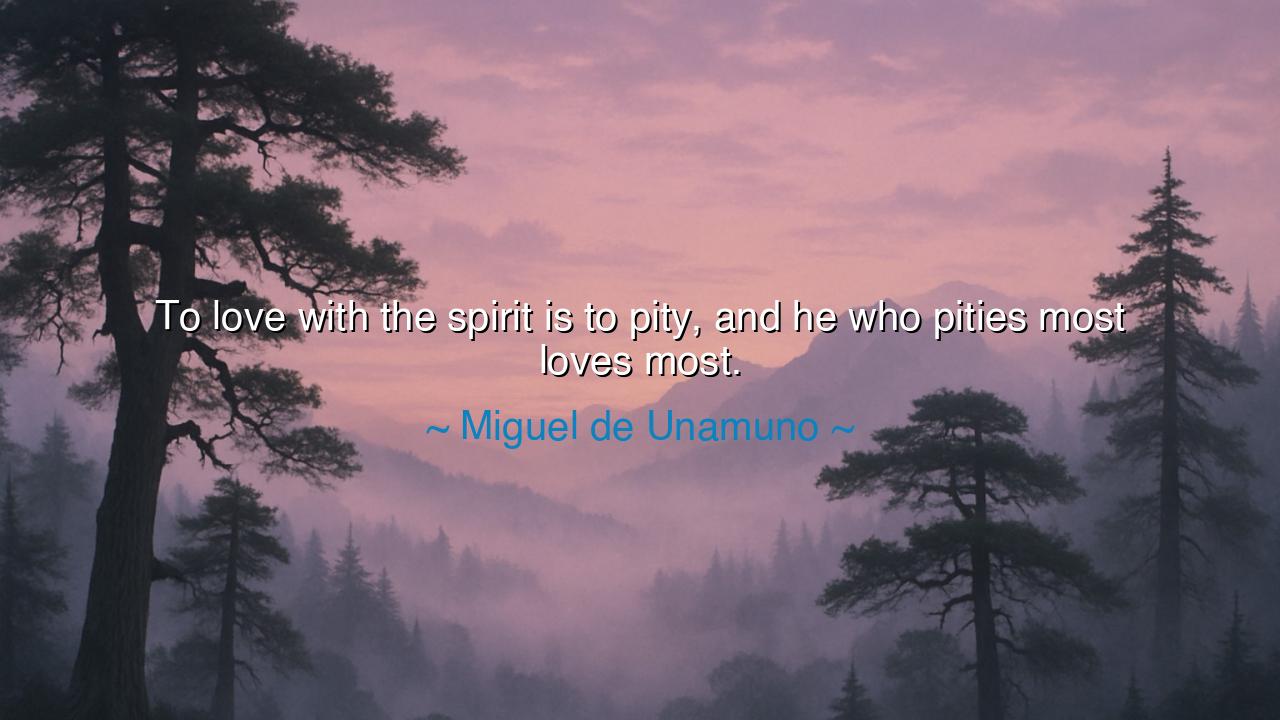
To love with the spirit is to pity, and he who pities most loves






“To love with the spirit is to pity, and he who pities most loves most.” Thus spoke Miguel de Unamuno, the philosopher of sorrow and faith, whose words pierce through the illusions of passion to reach the soul’s deepest truth. In this statement lies an understanding of love not as desire or delight, but as compassion — a sacred pity that arises when the heart sees the pain of existence and chooses to embrace it. For Unamuno, to love with the spirit is to look upon another not with selfish longing, but with tenderness for their frailty, their loneliness, and their mortality. The one who loves most is not he who seeks pleasure, but he who feels deeply the suffering of others and answers it with mercy.
Unamuno lived in a time of great turmoil, both political and spiritual. Spain was torn between faith and reason, tradition and modernity, and in this tension his heart burned with longing for meaning. He believed that true love must spring from the spiritual awareness of human fragility — that every man, no matter how strong or proud, carries within him the shadow of despair. To love, then, is to pity — not in the sense of condescension, but of shared sorrow. It is to look upon another being, trembling beneath the weight of mortality, and to say, “I see your pain, and I will not turn away.” This is not weakness; it is the highest form of courage, for it demands the opening of one’s soul to the suffering of the world.
This idea has ancient roots. The Greeks spoke of agape, the divine love that transcends desire, the love that gives without expecting. Christ himself wept for the world, his compassion stretching even to those who crucified him. In the Buddha’s teaching, too, the highest love is karuṇā — compassion born from the understanding that all creatures suffer. Unamuno’s words breathe this same eternal air. To love with the spirit is to feel this universal pain and to transform it into gentleness, patience, and forgiveness. Such love does not seek to possess, but to console; it does not seek to conquer, but to understand.
Consider the story of Mother Teresa, who walked among the dying and the forgotten in the streets of Calcutta. Her love was not born from passion or pleasure, but from pity — pity in its holiest sense. She saw in each broken body the reflection of the divine and offered her hands as vessels of mercy. She did not love because it was easy, but because she could not bear the thought of anyone unloved. In her, we see the truth of Unamuno’s words: he who pities most loves most. For only the one whose heart has been wounded by empathy can truly heal the wounds of others.
Yet, Unamuno’s pity is not despair — it is reverence. It is to recognize that suffering is not an accident but a thread woven into the human condition, binding us to one another. The one who loves with pity does not seek to erase pain, but to share it, to bear it together. In this way, pity becomes the bridge between souls, transforming isolation into communion. It is the flame of divine love burning within mortal hearts — the spirit that sees in another’s sorrow a mirror of its own.
And so, Unamuno calls us not to sentimental love, but to spiritual love — a love that does not flee from the darkness, but shines within it. To love thus is to look upon the world with eyes of compassion, to see even one’s enemies as fellow sufferers in the long night of existence. It is to feel sorrow not as a burden, but as a bond, a proof that we are alive and capable of tenderness. The world teaches us to harden our hearts, to protect ourselves from feeling too much — but the wise know that only through feeling deeply do we come close to the divine.
Therefore, my child, take this truth to heart: do not fear pity, for it is the wellspring of spiritual love. When you see another’s pain, do not look away; let your heart ache, and let that ache guide your actions. When you encounter cruelty, respond not with hatred, but with understanding. When you face your own suffering, remember that every soul you meet bears its own cross. In this way, you will learn to love as Unamuno loved — not with the fleeting fire of emotion, but with the eternal flame of compassion.
And remember always: to pity is not to lower oneself, but to rise to the level of the spirit. The one who pities most loves most because he sees most clearly — he sees the fragile beauty of humanity, the nobility hidden in its sorrow. Love that flows from pity is not weak, but divine, for it turns pain into purpose and solitude into communion. To love with the spirit is to live as one with all that breathes — to feel the heartbeat of the world and to whisper, “You are not alone.”






AAdministratorAdministrator
Welcome, honored guests. Please leave a comment, we will respond soon